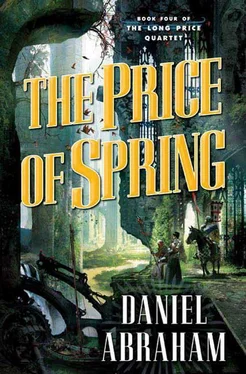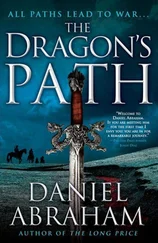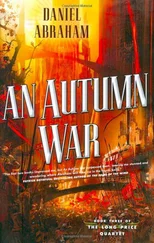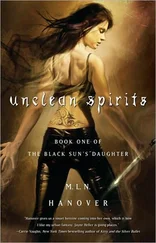Daniel Abraham - Price of Spring
Здесь есть возможность читать онлайн «Daniel Abraham - Price of Spring» весь текст электронной книги совершенно бесплатно (целиком полную версию без сокращений). В некоторых случаях можно слушать аудио, скачать через торрент в формате fb2 и присутствует краткое содержание. Жанр: Фэнтези, на английском языке. Описание произведения, (предисловие) а так же отзывы посетителей доступны на портале библиотеки ЛибКат.
- Название:Price of Spring
- Автор:
- Жанр:
- Год:неизвестен
- ISBN:нет данных
- Рейтинг книги:5 / 5. Голосов: 1
-
Избранное:Добавить в избранное
- Отзывы:
-
Ваша оценка:
- 100
- 1
- 2
- 3
- 4
- 5
Price of Spring: краткое содержание, описание и аннотация
Предлагаем к чтению аннотацию, описание, краткое содержание или предисловие (зависит от того, что написал сам автор книги «Price of Spring»). Если вы не нашли необходимую информацию о книге — напишите в комментариях, мы постараемся отыскать её.
Price of Spring — читать онлайн бесплатно полную книгу (весь текст) целиком
Ниже представлен текст книги, разбитый по страницам. Система сохранения места последней прочитанной страницы, позволяет с удобством читать онлайн бесплатно книгу «Price of Spring», без необходимости каждый раз заново искать на чём Вы остановились. Поставьте закладку, и сможете в любой момент перейти на страницу, на которой закончили чтение.
Интервал:
Закладка:
"I do," Otah agreed. Smiling, she looked young.
"I love you too, Papa-kya."
"May I sit with you?" he asked. "I don't want to distract you, but it would be a favor."
He brushed the back of her hand with his fingertips. She took him by the sleeve of his robe and pulled him down to sit beside her. The fingers of her left hand laced with his right. For a moment, the only sounds were the gentle lapping of the river against the stone, the diminished hush of torch fire, the cooing of owls. Eiah leaned forward, her fingertips on the first tablet. Otah let go, and both of her hands caressed the wax. She began to chant.
The words were only words. He recognized a few of them, some phrases. Her voice went out on the cool night air as she moved slowly across each of the shattered tablets. When she reached the end, she went back to the beginning.
Though there were no walls or cliffs to sound against, her voice began first to resonate and then to echo.
30
Maati traveled through the darkness alone. The sense of unreality was profound. He had refused Otah Machi, Emperor of the Khaiem. He had refused Otah-kvo. For years, perhaps a lifetime, he had admired Otah or else despised him. Maati had broken the world twice, once in Otah's service, and now, through Vanjit, in opposition to him. But this once, Otah had been wrong, and he had been right, and Otah had acknowledged it.
How strange that such a small moment should bring him such a profound sense of peace. His body itself felt lighter, his shoulders more nearly square. To his immense surprise, he realized he had shed a burden he'd been carrying unaware for most of his life.
Maati traveled through the darkness of Udun alone, because he had chosen to.
The brown vines and bare branches stirred in a soft breeze. The flutter of wings came from all around him, from nowhere. The air was cold enough to make his breath steam, and the voice of the river was a constant hush. With each step, some new detail of his path would come clear: an axe consumed by rust, a door still hanging from rotten leather hinges, the green-glowing eyes of some small predator. Cracks appeared in the paving stones, running out before him as if his passage were corrupting the city rather than revealing the decay already there.
He and Vanjit carried a history together. They had known each other, had helped each other. She would see that it was the andat's intervention that had turned him against her. The palaces of the Khai Udun grew taller and taller without ever seeming to come close until, it seemed between one breath and the next, he stepped into a grand courtyard. Moss and lichen had almost obscured the swirling design of white and red and gold stones. Maati paused, his lantern held over his head.
Once, it would have been a breathtaking testament to power and ingenuity and overwhelming confidence. Columns rose into the black air. Statues of women and men and beasts towered over the entranceway, the bronze lost under green and gray. He walked alone into a welcoming chamber too vast for his lantern to penetrate. There was no ceiling, no walls. The river was silent here. Far above, wings fluttered in still air.
Maati took a deep breath-dust and rot and, after a decade and a half of utter ruin, still the faint scent of smoke. It smelled like the corpse of history.
He walked forward over parquet of ebony and oak, the pattern ruined and pieces pried up by water and time. He expected his footsteps to echo, but no sound he made returned to him.
A light glimmered high up and to his left. Maati stopped. He lowered his lantern and raised it again. The glimmer didn't shift. Not a reflection, then. Maati angled toward it.
A great stone stairway swept up in the gloom, a single candle burning at its top. Maati made his way slowly enough to keep from tiring. The hall that opened before him was not as numbingly huge as the first chamber; Maati could make out the ceiling, and that the walls existed. And far down it, another light.
The carpets underfoot had rotted to scraps years before. The shattered glass and fallen crystal might have been the damage of the elements or of the city's fall. The next flight of stairs-equally grand and equally arduous-could only have been a testament to that first violence, long ago. A human skull rested at the center of every step, shadows moving in the sockets as Maati passed them. He hoped the Galts had left the grim markers, but he didn't believe it.
Here, Vanjit was saying, each of these is a life the soldiers of Galt ended. They were her justification. Her honor guard.
He should have guessed where the candles were leading him. The grand double doors of the Khai's audience chamber stood closed, but light leaked through at the seams. After so long in the dark, he halfexpected them to open onto a fire.
In its day, the chamber must have inspired awe. In its way, it still did. The arches, the angles of the walls, the thin ironwork as delicate as lace that held a hundred burning candles-everything was designed to draw the eyes to the dais, the black lacquer chair, and then out a wide, unshuttered window that reached from ceiling to floor. The Khai would have sat there, his city arrayed out behind him like a cloak. Now the cloak was only darkness, and in the black chair, Clarity-of-Sight cooed.
"I didn't think you'd come," Vanjit said from the shadows behind him. Maati startled and turned.
Exhaustion and hunger had thinned the girl. Her dark hair was pulled back, but what few locks had escaped the bond hung limp and lank, framing her pale face.
"Why wouldn't I?"
"Fear of justice," Vanjit said.
She stepped out into the candlelight. Her robes were silken rags, scavenged from some noble wardrobe, fourteen years a ruin. Her head was bowed beneath an invisible weight and she moved like an old woman bent with the pain for years. She had become Udun. The war, the damage, the ruin. It was her. The baby-the inhuman thing shaped like a baby-shrieked with joy and clapped its tiny hands. Vanjit shuddered.
"Vanjit-cha," Maati said, "we can talk this through. We can… we can still end this well."
"You tried to murder me," Vanjit said. "You and your pet poisoner. If you'd had your way, I would be dead now. How, Maati-kvo, do you propose to talk that through?"
"I…" he said. "There must… there must be a way."
"What was I supposed to be that I wasn't?" Vanjit asked as she walked toward the black chair with its tiny beast. "You knew what the Galts had done to me. Did you want me to get this power, and then forget? Forgive? Was this supposed to be the compensation for their deaths?"
"No," Maati said. "No, of course not."
"No," she said. "Because you didn't care when I blinded them, did you? That was my decision. My burden, if I chose to take it up. Innocent women. Children. I could destroy them, and you could treat it as justice, but I went too far. I blinded you. For half a hand, I turned it against you, and for that, I deserved to die."
"The andat, Vanjit-kya," Maati said, his voice breaking. "They have always schemed against their poets. They have manipulated the people around them in terrible ways. Eiah and I…"
"You hear that?" Vanjit said, scooping up Clarity-of-Sight. The andat's black eyes met hers. "This is your doing."
The andat cooed and waved its arms. Vanjit smiled as if at some unspoken jest, shared only between those two.
"I thought I would make the world right again," Vanjit said. "I thought I could make a baby. Make a family."
"You thought you could save the world," Maati said.
"I thought you could," she said in a voice like cold vinegar. "Look at me.
"I don't understand," he said.
"Look."
Her face sharpened. He saw the smudge of dust along her cheek, the stippled pores along her cheek, the individual hairs smaller than the thinnest threads. Her eyes were labyrinths of blood mapped on the whites, and the pupils glowed like a wolf's where the candlelight reflected from their depths. Her skin was a mosaic, tiny scales that broke and scattered with every movement. Insects too small to see scuttled through the roots of her hair, her eyelashes.
Читать дальшеИнтервал:
Закладка:
Похожие книги на «Price of Spring»
Представляем Вашему вниманию похожие книги на «Price of Spring» списком для выбора. Мы отобрали схожую по названию и смыслу литературу в надежде предоставить читателям больше вариантов отыскать новые, интересные, ещё непрочитанные произведения.
Обсуждение, отзывы о книге «Price of Spring» и просто собственные мнения читателей. Оставьте ваши комментарии, напишите, что Вы думаете о произведении, его смысле или главных героях. Укажите что конкретно понравилось, а что нет, и почему Вы так считаете.









